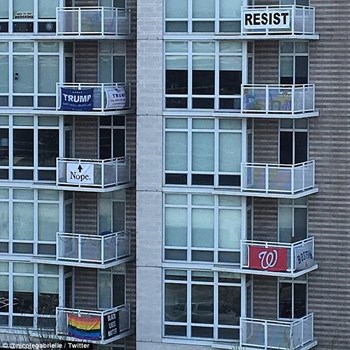
Regardless of one's political affiliation or viewpoints, fact is that the election of Donald Trump to the office of President has inspired what those in the media refer to as 'takes,' from all sides of the political and philosophical spectrum. The ubiquity (and volume) of the discourse has caused politics to spill out of the Beltway and the cable news bubble, often into spaces and interactions that heretofore had been apolitical – or at least not so wildly polarized. Those spaces definitely include residential buildings and associations, and multifamily administrators have had to navigate the new, fraught landscape with caution and prudence.
Several months ago, in the wake of President's Day and the protests that came with it, the New York Post reported on an Upper West Side co-op where many residents were posting political signs in the street-facing windows of their units. While window signs may not seem like an especially disruptive or revolutionary demonstration, displaying them does in fact violate the by-laws of most co-ops and condos. In this particular instance, the situation was resolved when the board reminded the sign-posters about the applicable rules. But given that there seems to be no end in sight to the current tensions, how can boards and management prepare themselves to deal with these types of violations going forward?
Not the Message, But the Means
Before last year's election, disagreements about political expression within condo and co-op communities was mostly a non-issue – so boards can be forgiven if they've not prepared to handle this type of controversy. Similarly, those residents displaying their feelings and allegiances can be excused for believing that they're exercising their constitutionally protected First Amendment right to free expression – but that doesn't mean they're correct.
In almost every case we have encountered, outright political expression is in violation of bylaws, and therefore won't stand in a condo or co-op, no matter how heated a particular election may be. But it's also important to realize that most bylaws prohibiting visible displays aren't designed expressly to limit political speech – they're just there to keep residents from cluttering up their windows and negatively impacting the building's appearance from the street.
“The language may read 'no sign, notice, advertisement or illumination shall be inscribed or exposed on or at any window or other part of the building, except if shall have been approved in writing by the lessor,'” says David Berkey, a partner with Gallet Dreyer & Berkey, LLP.
Far from trying to stymie dialog, this type of provision is usually made in the interest of the property itself and by extension, individual unit owners. “When people put things up in their windows, it's usually an eyesore when viewed from the street,” Berkey explains. “People will walk by and say 'What a crazy building; how do they let anyone do that?'”
“A violation of the bylaws is a violation of the bylaws,” says Leni Morrison Cummins, an attorney with Cozen O'Connor in New York City. “Boards of condos and co-ops should not be political, and must treat all shareholders and owners equally. If bylaws prohibit posting in windows, then regardless of the message, the board is required to act to uphold its governing documents. If a board enforces the bylaw provision unequally, allowing signage the board members support but others may not, then the board could be held liable for breach of fiduciary duty, and because the board failed to uphold its governing documents, the Business Judgment Rule would not serve to protect it from liability in this instance.”
“The First Amendment applies only to government action,” adds Austin Brown of The Austin Brown Law Firm in Manhattan. “A co-op or homeowner's association can ban political signs, even in ways that favor one message over another. However, an exception would likely be found with a Housing Development Fund Corporation or HDFC, which, due to entanglement with the government, are considered state actors for some constitutional law.”
Pick Your Battles
Brown acknowledges that, despite both house rules and actual law disallowing partisan content, residents may still assume that free speech applies everywhere, and thus protects the giant handmade sign they've hung off their balcony. “There's a political risk in challenging those assumptions,” he says. “Ultimately, a board should ask itself how much that fight is going to be worth.”
Should someone appear adamant about making their views explicit, Berkey recommends a board not so much discourage them as redirect that energy elsewhere. “The simplest way for a board to deal with this type of situation is to tell [the offender in question] that their political speech is fine if they use another method of expression,” he says. “Write a letter to the editor of the Times. Send Donald Trump an email. Do a tweet.”
At long last, a problem that can potentially be solved by making a post online.









Leave a Comment